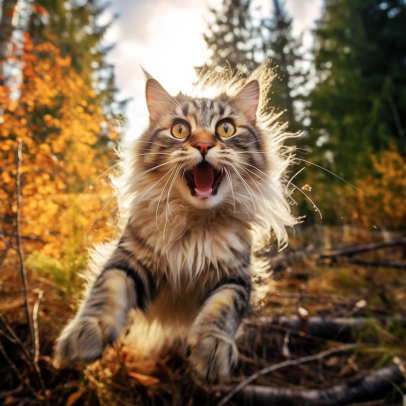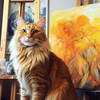The Majestic Maine Coon Cat: A Comprehensive Guide to Their History, Care, and Charismatic Personality

Introduction
History and Origins of Maine Coon Cats
Maine Coon cats have a fascinating history that traces back to the rugged state of Maine in the United States. While the exact origins of these magnificent felines are uncertain, several popular theories exist. One theory suggests that Maine Coon cats are descendants of long-haired cats brought to America by Viking explorers, while another speculates that they are a result of interbreeding between domestic cats and raccoons (though this theory is genetically impossible). Another plausible theory suggests that Maine Coon cats are a product of natural selection, adapting to the harsh New England climate. Regardless of their origins, Maine Coon cats have gained popularity for their striking appearance and endearing personalities.
Physical Characteristics of Maine Coon Cats
Maine Coon cats are known for their large size and impressive physical features. They are considered one of the largest domestic cat breeds, with males weighing anywhere from 13 to 18 pounds (5.9 to 8.2 kilograms) and females ranging from 8 to 12 pounds (3.6 to 5.4 kilograms). These cats possess a muscular and sturdy build with a rectangular body shape. One of their most distinctive traits is their long, bushy tail, which often exceeds the length of their bodies. Maine Coon cats also have a beautiful, dense, and water-resistant coat that comes in various colors and patterns, adding to their overall allure.
Temperament and Personality Traits
Maine Coon cats have earned a reputation for their friendly and sociable nature, making them excellent companions. They are known to be gentle, affectionate, and adaptable, making them suitable for households with children and other pets. These cats are often described as "gentle giants" due to their calm and easygoing temperament. Maine Coon cats are known to be intelligent and curious, enjoying interactive playtime and solving puzzles. They are also vocal and will often chirp or trill to communicate with their owners. Despite their size, Maine Coon cats are gentle and loving, forming strong bonds with their human family members.
Maine Coon Cat Care and Maintenance
Feeding and Nutrition for Maine Coon Cats
Proper nutrition is crucial for the overall health and well-being of Maine Coon cats. Due to their large size, they have specific dietary needs that should be met through high-quality cat food formulated for their breed. Maine Coon cats are prone to obesity, so it's essential to monitor their portion sizes and provide a balanced diet. Consult with a veterinarian to determine the appropriate feeding schedule and ensure that your Maine Coon cat receives the necessary nutrients for optimal health.
Grooming and Coat Care
Maine Coon cats have a luxurious coat that requires regular grooming to keep it healthy and free from matting. Their fur is dense and prone to tangling, so a daily brushing routine is recommended. Use a stainless steel comb or a slicker brush to remove loose hair and prevent the formation of mats. Additionally, regular nail trims, ear cleaning, and dental care are essential parts of their grooming routine. Taking care of their coat and overall grooming needs will help maintain the beauty and well-being of your Maine Coon cat.
Exercise and Playtime
Despite their large size, Maine Coon cats are active and playful creatures. Engaging them in regular exercise and playtime is crucial to prevent boredom and maintain their physical and mental health. Provide them with interactive toys, scratching posts, and climbing structures to satisfy their natural instincts. Play interactive games like fetch or use puzzle toys to keep their minds stimulated. Regular play sessions will not only keep them physically fit but also help strengthen the bond between you and your Maine Coon cat.
Health Concerns and Common Medical Conditions
Maine Coon cats are generally healthy cats, but like any breed, they may be prone to certain health conditions. Some common health concerns seen in Maine Coon cats include hypertrophic cardiomyopathy (a heart condition), hip dysplasia, and polycystic kidney disease. Regular veterinary check-ups and early detection are crucial in managing and treating these conditions. Be proactive in monitoring your Maine Coon cat's health and seek veterinary attention if you notice any changes in their behavior, appetite, or physical condition.
Vaccinations and Preventive Care
Proper vaccination and preventive care are essential for maintaining the health and well-being of Maine Coon cats. Consult with a veterinarian to develop a vaccination schedule tailored to your cat's specific needs. Maine Coon cats should receive core vaccinations against diseases such as feline panleukopenia, calicivirus, and herpesvirus. In addition to vaccinations, routine parasite control, including flea and tick prevention, is necessary. Regular check-ups and preventive care measures will help ensure a long and healthy life for your Maine Coon cat.
Maine Coon Cat Behavior and Training
Understanding Maine Coon Cat Behavior
Understanding the behavior of Maine Coon cats is essential for building a strong bond and promoting positive interactions. Maine Coons are known for being sociable and friendly, but they also have individual personalities and preferences. They may exhibit behaviors like kneading, chirping, or following their owners from room to room. Maine Coon cats are generally adaptable, but they may become stressed in certain situations. Familiarize yourself with their body language and behavior cues to better understand their needs and provide a nurturing environment.
Litter Box Training and Behavior Modification
Litter box training is a fundamental aspect of cat care, including Maine Coon cats. Provide a clean, easily accessible litter box and introduce your Maine Coon cat to it early on. Keep the litter box clean and use a litter type that your cat prefers. If your Maine Coon cat exhibits litter box problems, such as eliminating outside the box, it may indicate an underlying issue. Consult with a veterinarian to rule out any medical conditions and work on behavior modification techniques to address and correct the issue.
Socializing and Introducing Maine Coon Cats to Other Pets
Maine Coon cats are generally sociable and can adapt well to living with other pets. Proper socialization is crucial, especially when introducing them to new animals. Gradually introduce your Maine Coon cat to other pets in a controlled and supervised environment. Use positive reinforcement techniques and provide plenty of resources, such as separate food bowls, litter boxes, and resting areas, to ensure a harmonious living situation. Patience and gradual introductions will help facilitate a smooth transition and promote positive relationships between your Maine Coon cat and other pets.
Training Techniques and Tips for Maine Coon Cats
Maine Coon cats are intelligent and can be trained using positive reinforcement techniques. Start with basic commands such as sit, stay, and come, using treats and praise as rewards. Utilize interactive toys and puzzle games to engage their minds and keep them mentally stimulated. Maine Coon cats can also be trained to walk on a leash, which allows for supervised outdoor experiences. Consistency, patience, and positive reinforcement are key when training your Maine Coon cat, and remember to always respect their individual personalities and limitations.
Maine Coon Cat as a Family Pet
Maine Coon Cats and Children
Maine Coon cats are generally known for their friendly and gentle nature, making them well-suited for families with children. However, it's important to teach children how to properly interact with cats, including Maine Coons, to prevent accidental harm. Teach children to handle cats gently, avoid pulling their tails or ears, and respect their personal space. Supervise interactions between children and cats to ensure the safety and well-being of both parties. With proper introductions and supervision, Maine Coon cats can form strong bonds with children and become beloved family pets.
Maine Coon Cats and Other Pets
Maine Coon cats have a friendly and sociable nature that often allows them to get along well with other pets. However, each introduction should be done gradually and under supervision. Provide separate spaces, such as food bowls and resting areas, to allow each pet their personal space. Monitor their interactions and ensure that all pets feel safe and secure. Positive reinforcement and gradual introductions will help foster a harmonious relationship between your Maine Coon cat and other pets in the household.
Creating a Safe and Enriching Environment for Maine Coon Cats
To provide a safe and enriching environment for your Maine Coon cat, consider their unique needs. Provide scratching posts or cat trees to satisfy their natural instinct to scratch and climb. Ensure that your home is cat-proofed, removing any potential hazards or toxic plants. Maine Coon cats enjoy interactive toys and puzzles to keep them mentally stimulated. Additionally, create cozy resting areas and high perches to allow them to observe their surroundings. By creating an enriching and safe environment, you can help your Maine Coon cat thrive and enjoy their life as a cherished family pet.
Choosing a Maine Coon Cat
Finding a Reputable Maine Coon Cat Breeder
When looking to add a Maine Coon cat to your family, it's important to find a reputable breeder. Research breeders thoroughly and consider factors such as their reputation, breeding practices, and the health and temperament of their cats. A reputable breeder will prioritize the health and well-being of their cats, conduct necessary health tests, and provide proper documentation. Visit the breeder's facility if possible, and ask questions about their breeding program and the care they provide to their cats. Choosing a reputable breeder will help ensure that you bring home a healthy and well-socialized Maine Coon cat.
Adopting a Maine Coon Cat from a Rescue or Shelter
Adopting a Maine Coon cat from a rescue or shelter is a wonderful option for giving a deserving cat a loving home. Many Maine Coon cats end up in shelters or rescue organizations due to various circumstances. Visit local shelters and rescues, and inquire about Maine Coon cats available for adoption. Some organizations may specialize in specific breeds or have information on Maine Coon cat rescue groups. When adopting, inquire about the cat's history, temperament, and any specific care requirements. By adopting a Maine Coon cat, you not only give them a second chance but also open up space for another cat in need.
Factors to Consider When Selecting a Maine Coon Cat
When selecting a Maine Coon cat, consider various factors that match your lifestyle and preferences. Consider the cat's age, as kittens require more time and attention for socialization and training. Determine the desired gender and coat color/pattern that appeals to you. Take into account your home environment and available space for a Maine Coon cat's size and activity level. If you have existing pets, consider their compatibility with a new cat. By considering these factors, you can choose a Maine Coon cat that fits well into your family and living situation.
Bringing Your Maine Coon Cat Home and Introducing Them to Their New Environment
Bringing a Maine Coon cat home is an exciting time, but it's important to make the transition as smooth as possible. Prepare a designated space with all the essentials, including a litter box, food, water, and a cozy bed. Allow your Maine Coon cat to explore their new surroundings gradually, starting with a small, confined area and gradually expanding their access to the rest of the home. Provide plenty of affection, reassurance, and playtime to help them adjust. Patience is key during this transition period, and with time, your Maine Coon cat will feel comfortable and secure in their new home.
Frequently Asked Questions about Maine Coon Cats
How big do Maine Coon Cats get?
Maine Coon cats are known for their large size. Males typically weigh between 13 and 18 pounds (5.9 to 8.2 kilograms), while females generally range from 8 to 12 pounds (3.6 to 5.4 kilograms). However, it's important to note that each cat is unique, and size can vary.
Are Maine Coon Cats hypoallergenic?
Maine Coon cats are not hypoallergenic. While they produce fewer allergens compared to some other breeds, they still produce dander and can cause allergies in sensitive individuals. Regular grooming, cleaning, and minimizing exposure to allergens can help manage allergies.
How long do Maine Coon Cats live?
Maine Coon cats have a relatively long lifespan compared to other cat breeds. On average, they live between 12 and 15 years, but with proper care and a healthy lifestyle, some Maine Coon cats can live up to 18 years or more.
Do Maine Coon Cats require a lot of grooming?
Maine Coon cats have a dense, water-resistant coat that requires regular grooming to prevent matting and maintain its health. Daily brushing is recommended to remove loose hair and prevent tangles. Additionally, routine nail trims, ear cleaning, and dental care are important aspects of their grooming routine.
Do Maine Coon Cats like water?
Maine Coon cats are known for their unique affinity for water. While not all Maine Coon cats enjoy water, many of them exhibit a fondness for it that sets them apart from other cat breeds. Some Maine Coons may show curiosity and playfulness when it comes to water, while others may even join their owners in the shower or enjoy dipping their paws in a water bowl. This fascination with water can be attributed to their thick, water-repellent coats and their ancestral ties to the rugged Maine environment, where they may have needed to navigate water bodies for survival. However, it's important to note that individual preferences can vary, and not all Maine Coon cats will have the same level of interest or comfort with water. Always consider your cat's comfort and safety when introducing them to water-related activities.
Do Maine Coon Cats have an M on their forehead?
Yes, it is a common characteristic of Maine Coon cats to have an M-shaped marking on their forehead. The "M" is formed by the pattern of darker fur between their ears, extending down the bridge of their nose. This marking is often referred to as the "M" or "Mackerel" pattern and is seen in various tabby cats, including Maine Coons. The exact reason for this marking is not definitively known, but it is a distinctive and recognizable feature of many Maine Coon cats.
How many toes does a Maine Coon Cat have?
Maine Coon cats typically have five toes on their front paws and four toes on their back paws, totaling 18 toes in total. However, some Maine Coon cats may have extra toes due to a genetic mutation called polydactyly. Polydactyl Maine Coons can have additional toes on their paws, commonly referred to as "mitten paws" or "snowshoe feet." These extra toes can vary in number, ranging from one or two extra toes to even more. Polydactyly is not exclusive to Maine Coon cats but can occur in other cat breeds as well.
How much do Maine Coon Cats cost?
The cost of a Maine Coon cat can vary depending on several factors such as the cat's lineage, pedigree, age, location, and the reputation of the breeder. On average, you can expect to pay between $500 and $1,500 for a Maine Coon kitten from a reputable breeder. Show-quality Maine Coon kittens or those from top bloodlines can be priced higher, sometimes ranging from $1,500 to $3,000 or more.
It's important to note that purchasing a Maine Coon cat is not the only expense to consider. There will be additional costs for vaccinations, spaying/neutering, microchipping, and initial supplies such as litter boxes, scratching posts, and food. Ongoing expenses for food, litter, veterinary care, and grooming should also be factored into the overall cost of owning a Maine Coon cat.
If budget is a concern, another option is to adopt a Maine Coon cat from a rescue or shelter. Adoption fees are generally lower than purchasing from a breeder and typically range from $100 to $300. Adopting a Maine Coon cat not only provides a loving home to a deserving cat but also helps support rescue efforts and frees up space for other cats in need.
Do Maine Coon Cats get along with Dogs?
Yes, Maine Coon cats have a sociable nature and can typically get along well with dogs. Their friendly and adaptable temperament often allows them to form positive relationships with canine companions. However, successful cat-dog introductions require proper socialization, patience, and careful monitoring to ensure a harmonious coexistence. Gradual introductions, positive reinforcement, and providing separate spaces and resources for each pet are important steps in fostering a positive relationship between a Maine Coon cat and a dog. While individual personalities may vary, many Maine Coon cats can thrive in households with canine companions.
Is a Maine Coon Cat part raccoon?
No, Maine Coon cats are not part raccoon. Despite their name and the speculation that their origin may be linked to raccoons, there is no factual basis to support the idea that Maine Coon cats have raccoon ancestry. The name "Maine Coon" likely comes from their place of origin, the state of Maine in the United States, and the term "Coon" is believed to be a reference to their resemblance to raccoons due to their bushy tails and tufted ears. However, Maine Coon cats are a distinct breed of domestic cats and do not have any genetic relation to raccoons.
Conclusion
Maine Coon cats are truly captivating and wonderful companions. With their striking appearance, friendly nature, and unique characteristics, they have become one of the most beloved cat breeds. By understanding their history, physical characteristics, care needs, behavior, and the process of choosing and bringing one home, you can embark on a fulfilling journey with your Maine Coon cat. With love, care, and proper attention, your Maine Coon cat will bring joy, companionship, and endless memories to your life.

